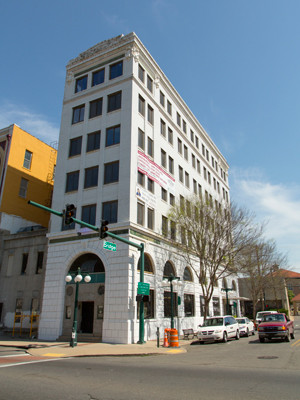A 74-bed assisted living center in west Little Rock weighed in at $14.07 million.
MHI Little Rock Ltd., an affiliate of Mainstreet Health Investments of Carmel, Indiana, bought the 43,988-SF Memory Care of Little Rock at Good Shepherd facility at 2501 Aldersgate Road.
The seller is MC-Little Rock AR-1 UT LLC, an affiliate of the Embree Group in Georgetown, Texas.
The 5.7-acre development previously was tied to a November 2014 mortgage of $9.5 million held by Metropolitan National Bank of Nashville, Tennessee.
The location was purchased for $745,000 in November 2014 from ERC Foundation Inc., led by Mark Davis.
CVS Transaction
A 13,536-SF CVS Pharmacy in southwest Little Rock changed hands in a $5.71 million sale.
Centennial Associates No. 1 LLC and Centennial Associates No. 2 LLC, both in Narberth, Pennsylvania, acquired the 8902 Geyer Springs Road project.
The seller is MC Little Rock AR Landlord LLC, an affiliate of SunTrust Equity Funding LLC of Atlanta.
The 2.31-acre development is backed with a $3.4 million loan from First Fidelity Bank of Oklahoma City. The location was assembled in three transactions totaling $2.08 million.
The sellers were the John Perry Trust, $880,000 in April 2015 for the Advantage Auto Parts store at 8902 Geyer Springs Road; APS Investment LLC, led by Avtar Momi and Satpal Kamboj, $800,000 in May 2015 for the Exxon Food Mart project at 6001 Baseline Road; and JV Holding Co., led by John Vice II, $400,000 in May 2015 for a 1.16-acre parcel.
Grill Acquisition
A 7,090-SF eatery in west Little Rock tipped the scales at $2.52 million. DB Triple Dipper Restaurant LLC, an affiliate of Fortress Investment Group of New York, purchased Romano’s Macaroni Grill at 11100 W. Markham St. from Centre Structured Trust 2 of New York.
The 2.64-acre development is helping secure a $70.4 million funding agreement with Wells Fargo Bank of Sioux Falls, South Dakota.
The property previously helped secure a November 1997 mortgage of $10.5 million held by First Union National Bank of Charlotte, North Carolina.
The project was purchased for $2.01 million more than 19 years ago from Modernage Inc., an affiliate of Brinker International in Dallas.
Liquid Assets
A beverage project in Little Rock is under new ownership after a $1.65 million transaction.
Turner Holdings LLC, an affiliate of Hiland Dairy Co. of Springfield, Missouri, bought the 97,378-SF Shooting Star Beverages facility at 6921 Interstate 30 from the receiver for Clear Water Holdings LLC of Tulsa.
The 17.67-acre property helped secure mortgages totaling $13 million held by Simmons Bank of Pine Bluff.
Clear Water acquired the former Mountain Pure Water property as part of a $6 million foreclosure sale in October 2014. Simmons held a March 2014 foreclosure judgment of $16.7 million against Mount Pure.
The judgment was connected with a series of loans made by Little Rock’s Metropolitan National Bank and inherited by Simmons, which bought Metropolitan in a bankruptcy auction.
Warehouse Package
Warehouse property in south Little Rock rang up a $750,000 sale.
3200 Myers Street Partners LLC of Colton, California, purchased a 34,688-SF warehouse at 3015 Lewis St., a 30,360-SF warehouse at 3100 Elm St., a 9,500-SF warehouse at 4313 Asher Ave., a 6,500-SF warehouse at 4119 Asher Ave. and a 4,800-SF warehouse at 3013 Lewis St.
The seller is Moon Distributors Inc., led by Stan Hastings. The deal is financed with a three-year loan of $525,000 from Stone Bank of Mountain View.
The Hastings family assembled the properties in seven transactions with:
- The H.L. Remmel estate, $4,000 in September 1945 for the 1.22-acre 3100 Elm St. development, the 1.05-acre 3015 Lewis St. development and the 0.17-acre 3013 Lewis St. development.
- J.R. and Helen Rice, an undisclosed sum in August 1946 for the 0.16-acre development at 4119 Asher Ave.
- Marie Meyers Busch et al, $8,000 in November 1947 for the 0.31-acre development at 4313 Asher Ave. and a 0.57-acre property at the southeast corner of 31st and Cedar streets
- Fidelity Realty Co., led by E.J. Pope, $12,000 in March 1959 for a 1.16-acre property at the southeast corner of 31st and Cedar streets.
- Reva Moravec, Charlie and Beulah Henderson and Grady and Irene Hen-derson, $6,000 for a 0.32-acre parcel on Lewis Street.
- Alva L. Smith estate, $5,000 in August 1975 for a 0.17-acre parcel on Lewis Street.
- Verna Stinson, $4,000 in February 1997 for a 0.16-acre parcel near the southeast corner of Asher Avenue and Lewis Street.
Multifamily Sale I
Seven apartment buildings in North Little Rock drew a $600,000 transaction.
Johan and Juanita Adineh-Kharat acquired 33 units at 4905, 4909, 5001, 5005, 5009, 5101 and 5105 N. Walnut Road from Sharon Smith.
The deal is funded with a one-year loan of $1.3 million from First Arkansas Bank & Trust of Jacksonville.
The combined 1.94-acre property was assembled during July 1966 through July 1970 in seven transactions totaling more than $25,000 with Metropolitan Trust Co., led by Justin Matthews III.
Multifamily Sale II
A 24-unit apartment project and adjoining land in Little Rock sold for $435,000. Town Creek LLC, led by Randy Ferguson, bought the Mabelvale Apartments at 7414 Mabelvale Pike and a neighboring 1.2-acre parcel.
The seller is 133 LLC, led by Keith Jackson.
The combined 1.87-acre property previously was linked with a September 2011 mortgage of $467,500 held by BancorpSouth Bank of Tupelo, Mississippi.
The property was acquired for $550,000 in September 2011 from the Harold E. Tucker Irrevocable Trust.
Country Club Manor
A 5,012-SF home near the Country Club of Little Rock tipped the scales at $1.29 million.
Robert and Eliza Gaines purchased the house from Clark and Katherine Raborn. The deal is backed with a 30-year loan of $800,000 from IberiaBank of Lafayette, Louisiana.
The residence previously was tied to a May 2012 mortgage of $900,000 and May 2014 mortgage of $125,000 held by Quicken Loans Inc. of Detroit.
The property was bought for $360,000 in November 2006 from the Patrick R. Harding Revocable Trust.
Duclair Court
A 4,352-SF home in the Duclair Court neighborhood of west Little Rock’s Chenal Valley development changed hands in a $625,000 sale.
William and Mary Cavin acquired the house from the Suzanne Lindsay Bradshaw Revocable Trust.
The residence previously was linked with a June 2016 mortgage of $600,000 held by IberiaBank.
The property was purchased for $720,000 in May 2007 from Dr. Thomas Horn and Donald Levin.
Lamarche Abode
A 4,424-SF home in the Lamarche Place neighborhood of west Little Rock’s Chenal Valley development is under new ownership after a $530,000 transaction.
Steven and Ashley Smith bought the house from Phillip and Lauri Currier. The deal is funded with a 30-year loan of $424,000 from IberiaBank.
The residence previously was tied to a July 2006 mortgage of $370,000 held by Pulaski Mortgage Co. of Little Rock.
The location was acquired for $90,000 in April 2005 from Rangaswamy and Sabitha Govindarajan.
Seven-Digit Construction
Rodney Parham Storage Center $2,200,000
9305 N. Rodney Parham Road, Little Rock
Rodney Parham Storage Center LLC, Fayetteville





